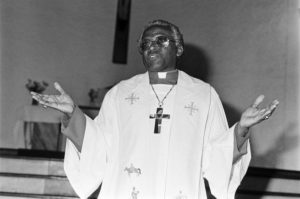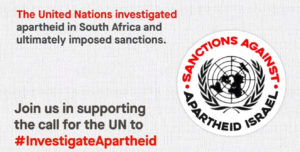Marty Levine
December 27, 2021
I woke this morning to the news that Archbishop Desmond Tutu had died.
Among the flood of tributes and remembrances were these words from the Dalai Lama, “Archbishop Desmond Tutu was entirely dedicated to serving his brothers and sisters for the greater common good. He was a true humanitarian and a committed advocate of human rights. His work for the Truth and Reconciliation Commission was an inspiration for others around the world. With his passing away, we have lost a great man, who lived a truly meaningful life. He was devoted to the service of others, especially those who are least fortunate. I am convinced the best tribute we can pay him and keep his spirit alive is to do as he did and constantly look to see how we too can be of help to others.”

The archbishop saw the echoes of his own fight for freedom in the struggle of the Palestinian people. And he chose to speak up and challenge the status quo. He recognized the supportive role that South African Jews had played in the struggle for Black freedom. But he could not remain silent. In a public statement on the need to protest he the importance of nonviolent protest of injustice. “In South Africa, we could not have achieved our democracy without the help of people around the world, who through the use of non-violent means, such as boycotts and divestment, encouraged their governments and other corporate actors to reverse decades-long support for the Apartheid regime. My conscience compels me to stand with the Palestinians as they seek to use the same tactics of non-violence to further their efforts to end the oppression associated with the Israeli Occupation”.
Support for his movement’s call for individuals and businesses and governments across the globe to apply non-violent pressure on the Apartheid government by boycotting, divesting, and Sanctioning (BDS) had taught the archbishop an important lesson. He saw what was needed to address the evil of Israeli occupation.

In a 2014 Op-ed he published in the Israeli daily Haaretz he put that forward very clearly. “Those who continue to do business with Israel, who contribute to a sense of ‘normalcy’ in Israeli society, are doing the people of Israel and Palestine a disservice. They are contributing to the perpetuation of a profoundly unjust status quo. Those who contribute to Israel’s temporary isolation are saying that Israelis and Palestinians are equally entitled to dignity and peace. Ultimately, events in Gaza over the past month or so are going to assess who believes in the worth of human beings. It is becoming more and more clear that politicians and diplomats are failing to come up with answers, and that responsibility for brokering a sustainable solution to the crisis in the Holy Land rests with civil society and the people of Israel and Palestine themselves.”
Following his lead and the lessons of his life may be too much to ask of my fellow Jews who cannot stomach any challenge to Israel’s oppression of Palestine and Palestinians.
In July, ice cream maker Ben & Jerry made a decision that followed Tutu’s lead when it decided to no longer allow its products to be sold in occupied Palestinian territories. “We believe it is inconsistent with our values for Ben & Jerry’s ice cream to be sold in the Occupied Palestinian Territory (OPT)…. We’re a values-led company with a long history of advocating for human rights, and economic and social justice. We believe it is inconsistent with our values for our product to be present within an internationally recognized illegal occupation.”
On Wednesday, the power and influence of major Jewish organizations were rewarded when an obscure Illinois state administrative body, the Illinois Investment Policy Board (IIPB), block-listed Unilever, the multinational corporation which owns Ben and Jerry for it actions. IIPB was using a state law that the Chicago Jewish Federation had worked hard to pass that required state pension funds to disinvest from corporations that had the temerity to question the ethics of doing business in a state they considered apartheid. The work of Jewish organizational power has been able to get similar legislation enacted in 30 states.
These organizations applauded the action. The Conference of Presidents of Major Jewish Organizations applauded “this decision We continue to support legal efforts in over 30 states to hold to account companies that engage in similar boycotts of Israel, and demand that Unilever publicly reject this shameful, discriminatory campaign.” Mark Wilf, chairman of the board of trustees for the Jewish Federations of North America, said this “is an important milestone against attempts to apply double standards and delegitimize the Jewish state.”
Do these words of admonition now form the basis of a Jewish Communal obituary for Archbishop Tutu? Will he be remembered by the Conference of Presidents and the many organizations that are its members as an enemy, as an anti-Semite, as they are wont to label any voice that supports BDS?
Or will his memory be edited so the love and reverence that surrounds his memory may be appropriated for their own purposes?
If you think this is an absurd question, consider how the memory of Dr. Martin Luther King, Jr. has been used. Just days ago Florida Governor Ron DeSantis, used Dr. King’s reputation as a shield from criticism saying, “You think about what MLK stood for. He said he didn’t want people judged on the color of their skin but on the content of their character.”
The criticism he was deflecting was to his call for even more legislation to criminalize the teaching of American History in a manner that valued the centuries of African American history and recognized the 2021 realities. “As The Washington Post has noted, King’s children have rejected similar claims made by other conservative lawmakers, who have wrongly asserted that King would be in favor of banning lessons on racism and racial justice in K-12 classrooms.”
Join me in watching as Archbishop Tutu’s life is celebrated, as obituaries and tributes flow. Let’s monitor how the Jewish Community learns or ignores his wisdom.
Tough love is still loved. Important lessons are often difficult because they bring core assumptions into question.
May the memory of Archbishop Desmond Tutu serve as a blessing. May the ears and minds of Israel’s supporters be opened to hearing the Archbishop’s love and wisdom.
